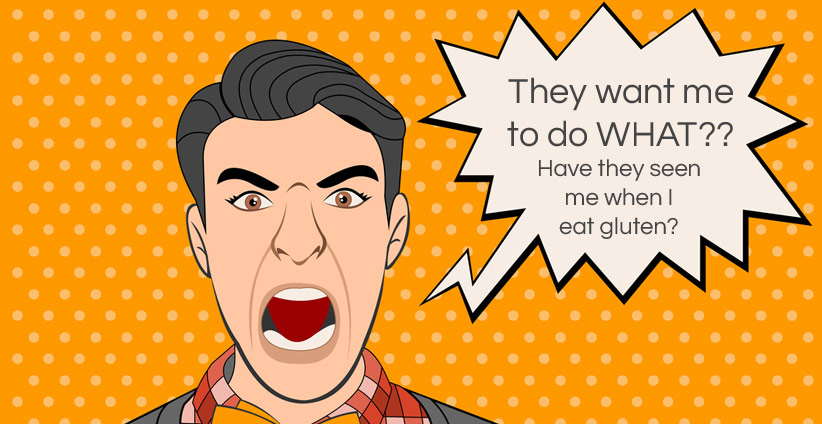So, what happens when we ingest gluten? Here are only a few of the outcomes:
- Exhaustion beyond belief
- Severe brain fog
- Irritability
- Intense itching
- Achy joints
- Agitation and short temper
- Severe stomach pain
- Difficulty making decisions
- Extreme mood swings
- Migraines
You get the idea. It’s dreadful. Not only does it bring about symptoms, let’s not forget that it’s actively harming our bodies and damaging our intestines. So even if you don’t experience symptoms, you’re still taking a hit.
Given all this, why would anyone with celiac disease willingly consume gluten? They wouldn’t. For the most part, we acknowledge and understand that gluten is our adversary, and we must be as strict and diligent as possible to remain 100% gluten-free. We reluctantly accept it as part of our journey.
Yet, why are some prominent figures in the celiac community advocating for gluten consumption?
Here are two examples:
- Coeliac UK, the oldest and largest celiac disease charity globally, recently endorsed a study conducted by the University of Roehampton in London. The study is exploring the potential benefits of “GLUTEN FRIENDLY BREAD” for individuals with celiac disease. The bread contains between 21-100ppm gluten. To participate, you must be a diagnosed celiac, following a gluten-free diet for at least a year, and “not extremely sensitive to exposure to gluten.” It’s this last criterion that raises concern. As I’ve mentioned, lack of symptoms does not necessarily equate to lack of damage. Here is a link to the study.
- The University Of Chicago Medicine Celiac Disease Center is recruiting individuals with celiac disease for a clinical trial to evaluate the efficacy of a pill to “treat” celiac disease. Note the emphasis on “TREAT” because it’s not a cure—just a pill that might mitigate the damage caused by gluten. To qualify, you must have celiac disease and be willing to consume gluten-containing bread for a three-month period. And what’s the compensation? $160. Barely enough to cover the cost of the toilet paper you’d likely need.
Now, don’t get me wrong. I acknowledge the valuable work both of these organizations do for our community, and this isn’t a personal attack. However, I do question their judgment. It sends a message—to me and anyone considering the studies—that a little gluten won’t do much harm. Perhaps they’re seeking volunteers to take one for the team, so to speak, but are the potential benefits truly worth the risk?
In my opinion, absolutely not.
